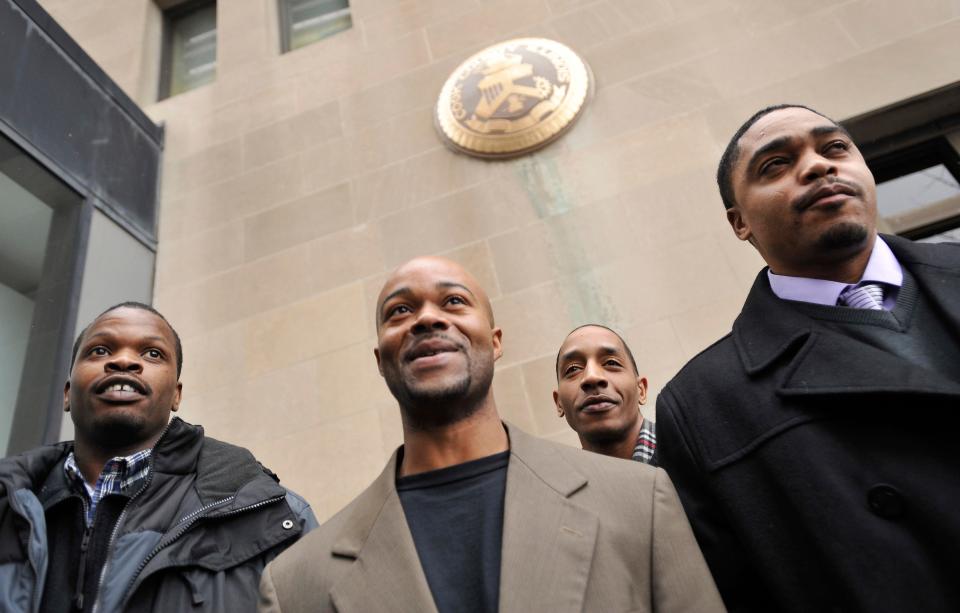Illinois Gov. JB Pritkzer signs bill banning law enforcement from lying to minors during interrogations
CHICAGO — Terrill Swift was 17 years old when Chicago police officers asked him to come down to the station and lied to him during an interrogation, accusing him of raping and murdering a woman with three other teens he didn't know.
Swift, a member of the so-called "Englewood Four," spent more than a decade in prison for a crime he did not commit. He was exonerated in 2012 based on DNA evidence.
"This happens so much, and it's something that needs to change," Swift said Thursday, visibly emotional as he spoke to a room full of exonerated people gathered at the Northwestern Pritzker School of Law.
Gov. J.B. Pritkzer signed a bill Thursday making Illinois the first state to bar law enforcement officers from lying to minors during interrogations, a practice critics say increases the likelihood of a minor making a false confession.
If a law enforcement officer knowingly "deceives" a minor during an interrogation – "the knowing communication of false facts about evidence or unauthorized statements regarding leniency" – any statements from the minor would be inadmissible as evidence in court, according to the bill, which takes effect Jan. 1, 2022.
"This bill, I truly believe, could have saved my life," Swift said.
Study: Police misconduct, such as falsifying evidence, is a leading cause of wrongful convictions
'A watershed moment': Illinois becomes first state to mandate Asian American history in public schools
The bill received wide support in the Illinois General Assembly and from the state’s chiefs of police, the Illinois State’s Attorneys’ Association and Cook County State’s Attorney Kim Foxx.
"This is about public safety," Foxx said Thursday. "Trust and legitimacy in our criminal justice system is how we get people who would be reluctant to engage with us to engage – when we convict the right people."

Illinois state Sen. Robert Peters said the signing is Chicago's first step in the "long journey to end the infamy of the false confession capital of the world."
It was previously legal for police in all 50 states to lie during interrogations. False confessions have played a role in about 30% of all wrongful convictions overturned with DNA evidence, according to the Innocence Project, a nonprofit working to exonerate wrongly convicted people. People under 18 are two to three times more likely to falsely confess than adults, according to a 2017 article in the New York University Law Review.
"Most people don’t realize that this is legal in the first place, which is part of the problem," said David Thompson, president of Wicklander-Zulawski & Associates, Inc., a consulting and law enforcement training firm that supported the bill. "A lot of juveniles are unaware that this tactic is permissible, which puts them in a vulnerable position."
Police don't all act 'the same way': White officers use force more often, Chicago police study finds
'I want justice to be served': Man claims Chicago cop framed him for murder at 15. Lawyers say they can prove it
Illinois is the first state to pass such a bill, but similar legislation is pending in New York and Oregon, according to the Innocence Project. In Illinois, there have been 100 wrongful convictions predicated on false confessions, 31 of which involved minors in recent years, according to the state's chapter of the national nonprofit.
"This moment is about repairing the harm that has been done by this system, especially to those from Black, brown and Indigenous communities," Lt. Gov. Juliana Stratton said Thursday.
The Innocence Project highlighted a series of group exonerations of young people in Illinois and several high-profile cases outside the state, including the Central Park Five. In New York, five Black and Latino teens, now also known as the Exonerated Five, were coerced into confessing to a rape they didn’t commit in 1989 and served prison time before being exonerated in 2002.
Rebecca Brown, director of policy at the Innocence Project who was involved in the Illinois bill, said enforcement of the new law is predicated on a previous statute that mandates the recording of interrogations. Former President Barack Obama, then a state senator, introduced that legislation in 2003.
"The presence of a video tape will have a chilling effect on the use of deception now that is it also law," Brown said.
Twenty-seven states mandate the recording of interrogations in criminal investigations, Brown said.
This article originally appeared on USA TODAY: Illinois bans law enforcement from lying to minors in interrogations

